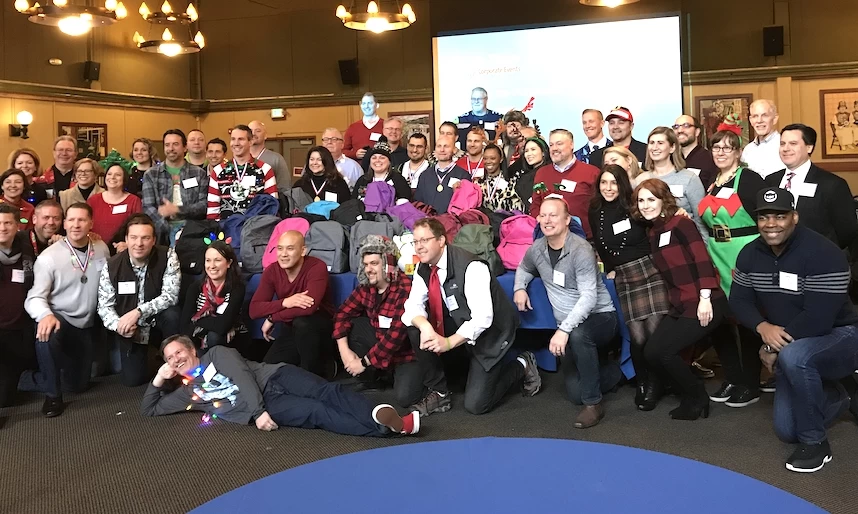There are numerous benefits of corporate social responsibility (CSR) programs—for companies, their employees, and their communities. If your organization doesn’t already have a corporate social responsibility program in place, or it’s limited to financial elements like charitable contribution matching, you’re missing out on opportunities to improve employee engagement, loyalty, and much more.
As noted in our previous post on statistics about the value of CSR programs, more than 80% of executives recognize the importance of CSR programs to employees and customers, and most have some elements in place.
But only about half “believe peer-to-peer engagement is essential in their CSR programs,” and many of those engage in organized CSR activities only on a sporadic, irregular basis.
This post will look at what a comprehensive corporate social responsibility program includes, how these programs benefit your community, your team, and your business, and how to implement or expand a CSR program within your company.
What is a Corporate Social Responsibility Program?
Broadly speaking, a corporate social responsibility program is a set of activities and policies designed to help the general public (for example, by reducing waste streams), customers, employees, and financial stakeholders.
The benefits of corporate social responsibility accrue to multiple stakeholders and over the long term optimize financial performance by building an admired brand and improving the organization’s ability to attract and retain top talent.
A corporate social responsibility typically includes multiple elements, among them:
- Corporate financial matching for employee charitable contributions
- Efforts to reduce energy use and waste and increase sustainability
- Non-discriminatory practices to ensure workplace diversity and equality
- Support for employee mental health and well-being
- Regular opportunities for employees to engage in programs to benefit charitable causes and the community.
While 71% of U.S. companies report having a CSR program in place, just 13% of employees say “their organization’s CSR commitments are driven by ‘doing the right thing.’” And according to the Harvard Business School, while 90% of executives “believe a strong sense of collective purpose within their organization drives employee satisfaction…Only 46 percent of executives say their organizations currently operate with a strong sense of purpose.”
So, while the implementation of at least some elements of a corporate social responsibility program is fairly widespread, there is clearly room for improvement in the design and execution of those programs.
The best way to make employees feel truly involved in their company’s efforts to “do the right thing” is to provide regular opportunities for them to engage with coworkers in activities specifically organized to benefit worthy causes.
Structured charitable CSR activities designed to benefit different groups such as children, the homeless, veterans, or those with mobility issues, demonstrate the company’s commitment to the local community while increasing employee engagement and loyalty by giving employees the opportunity to participate side by side with their peers in programs that give back.
Benefits of Corporate Social Responsibility Programs
Businesses, employees, and deserving nonprofits all benefit from corporate social responsibility initiatives. For large enterprises, research from Project ROI found that engaging in and promoting CSR activities promotes:
- Reduced stock price volatility by 2-10%
- Increased the ability to charge a product price premium by up to 20%
- Increased productivity by up to 13%Increased employee engagement by nearly 8%
The next two sections explore how CSR programs benefit your community and your employees.
How CSR Programs Benefit Your Community
CSR programs not only demonstrate that your company cares about giving back, but also make your community a better place to live by addressing basic needs and social issues. Here are five examples of ways that CSR programs can benefit local communities:
-
Reduce hunger
CSR programs can enable employees to work together to combat hunger and food insecurity. For example, BEST programs like our Donation Nation Care Packs provide care packages to homeless shelters and other organizations, while our Mini-Golf Build and Food Donation supports local food banks.
-
Care for kids
Several of our programs have been developed to help children growing up in challenging circumstances. Bears and Blankets comforts young children in distress; our Bike Build Donation® gives disadvantaged kids their first bike; and participants in our Fostering Hope program assemble backpacks for children in adoptive and foster care.
-
Address mental health issues
Our Autism Sensory Donation program not only brings employees together to assemble therapeutic sensory support kits for donation to autism therapy programs and non-profits but also enhances awareness of the disorder. At the other end of life, Project Alzheimer’s™ is a heartwarming program that helps those living in nursing homes, particularly individuals with Alzheimer’s Disease or other causes of dementia.
-
Support education
We offer several programs that support education in various ways, from our Build-a-Guitar® and Build-a-Band® programs that enhance music education to STEM Backpacks for Kids to our We Care for Schools program, which benefits local schools that are in dire need of supplies, including pencils, paper, glue, paintbrushes, first aid kits, and more.
-
Improve the environment
Addressing an area of increasing focus, our Earth Wind and Solar program combines the engaging experience of building and racing solar-powered vehicles with a donation that will spark children’s curiosity and exposure to STEM.
How CSR Programs Benefit Your Team
Research consistently shows that employees want to work at companies with purpose. They value opportunities to give back to the community through volunteering but often have difficulty finding time to do so during non-work hours.
Consequently, they appreciate it when their employer demonstrates a commitment to both giving back to the community and to fulfilling the desire of employees to give back by organizing CSR programs both on a periodic basis and as part of larger corporate events.
Research from America’s Charities found that 82% of employees want opportunities to volunteer with peers in corporate-supported events. Here are four key ways that employees benefit from corporate social responsibility programs:
-
Help worthy causes
CSR programs enable employees to exercise their collaboration and problem-solving skills while helping deserving groups, from children (e.g., through our Kids Rock!™ charity team building event) to the homeless (through our Helping the Homeless program) to seniors and others with mobility issues (Build-a-Wheelchair®).
-
Feel pride in their employer
Supporting local causes and giving back to the community builds a strong, positive brand image for companies. Employees take pride in working for an organization that is recognized for its generosity to local nonprofits.
-
Increase engagement and loyalty
In addition to doing good and challenging employee skills, CSR events are fun. As we noted in our post here about the impact of CSR on employee loyalty, “any type of team building program has a positive impact on employee morale and engagement. But incorporating CSR takes those effects to a higher level.”
-
Strengthen workplace relationships
When employees are able to see the impact of their CSR program participation—like the looks of surprise and joy when a group of kids receives their first bikes—it creates a powerful, emotional, shared memory with their work team.Those individuals won’t remember every trivia question they had to answer, but they’ll never forget how they felt. Being part of a team that accomplishes that creates a bond that carries through to the workplace.
How to Implement a Corporate Social Responsibility Program at Your Workplace
In companies with strong and broad CSR programs already in place, the commitment to giving back starts at the top and filters down through almost every role in some way. Information about the organization’s corporate social responsibility activities is often included as part of the new employee onboarding process.
But if your workplace isn’t one of those companies and has only a limited CSR program or even none at all, start by talking to your manager and to your human resources department, where employee involvement in CSR often begins.
As we noted in our post on how to talk to your manager about team building, begin by thinking about and building your case, being prepared to talk about how it develops communication and collaboration skills. Then, layer on the benefits of corporate social responsibility events specifically, from improving brand image to helping the community.
With your plan in place, break the ice, schedule a meeting, and start the conversation!
You may want to include examples of how CSR programs can help specific groups and causes, from kids to people experiencing homelessness, as noted above, to animal shelters (through our Putting for Pets program), and military veterans through our Operation Military Care activity, where your team will assemble care packages for donation to service men and women and their families.
Taking the initiative to get the ball rolling on implementing a CSR program in your workplace might mean some extra work for you but also the recognition and appreciation from the company’s leadership and your coworkers as the business begins seeing the benefits of corporate social responsibility.
Corporate Social Responsibility Programs: A Win for Your Company and Community
CSR programs are a win-win-win proposition.
They benefit companies by enhancing brand image, employee engagement, and productivity.
Corporate social responsibility programs benefit the local community by improving the quality of life, contributing to deserving local nonprofits, and supporting causes, from helping the homeless and hungry to providing wheelchairs and rollators to those with mobility impairments.
They benefit employees by building stronger workplace relationships, enhancing collaboration and problem-solving skills, and providing them with the opportunity to give back to the community within the context of their work day.
Get your CSR program started on the path to success by working with professionals who have been delivering CSR team-building events to corporations across America for over a decade. Learn more about our corporate team building expertise and contact us to discuss how we can support your CSR initiatives.






